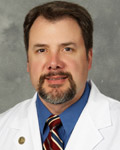J. William Harbour, M.D., has been named the Paul A. Cibis Distinguished Professor of Ophthalmology and Visual Sciences at Washington University School of Medicine in St. Louis.

Washington University Chancellor Mark S. Wrighton joined Larry J. Shapiro, M.D., executive vice chancellor for medical affairs and dean of the School of Medicine, in announcing the appointment.
“Endowed professorships are among the most important gifts a university can receive because they allow us to recognize outstanding individuals and to support their important contributions in research and education,” Wrighton says. “In addition to supporting Dr. Harbour’s current work, this distinguished chair also honors a seminal figure in Washington University’s history.”
“Dr. Paul Cibis was one of the true pioneers of modern vitreoretinal surgery, a remarkably gifted clinician and scientist,” Shapiro says. “It is highly appropriate that a professorship endowed in his name help to support the work of Bill Harbour, a physician/scientist who is one of our most gifted eye surgeons.”
The Cibis Distinguished Professorship was established in 2000 by a donor who wishes to remain anonymous. It honors the late Paul A. Cibis, M.D., an important figure in the history of Washington University’s Department of Ophthalmology and Visual Sciences.
“Dr. Cibis helped increase our understanding of retinal disease and helped to develop new therapeutic approaches that have provided benefits for millions of patients,” says Michael A. Kass, M.D., head of the Department of Ophthalmology and Visual Sciences. “In a similar way, Dr. Harbour’s current research on the link between genetics and prognosis for patients with eye tumors will transform the way we care for these patients.”
Harbour specializes in the diagnosis and treatment of eye tumors. He directs the Ocular Oncology Service at Washington University School of Medicine. Through the service, housed in the Barnes Retina Institute, he is actively involved in the training of medical students, residents and fellows. Harbour also lectures locally, nationally and internationally.
He has been involved in cancer research since 1988 when he was the first author of a groundbreaking study that appeared in the journal Science describing changes in the tumor suppressor gene that cause the childhood eye cancer called retinoblastoma.
Harbour also studies a type of cancer called ocular melanoma, which is the most common form of eye cancer in adults. Although there are now several ways to treat this eye cancer, they do not always prevent it from spreading outside of the eye. Harbour and colleagues recently provided new insight into the problem when they discovered a molecular signature in the eye cancer that predicts when it is likely to spread beyond the eye, allowing high-risk patients to receive early attention before the cancer emerges elsewhere in the body. Harbour is working to develop a clinical test that can be used to guide the management of individual patients with ocular melanoma.
“With these recent discoveries linking molecular signatures with cancer behavior, ocular melanoma provides an excellent example of the emerging genome-guided medicine in which global genetic alterations in cancer cells now can be used when deciding how to care for an individual patient,” says Harbour, also an associate professor of molecular oncology and of cell biology.
Harbour was born in Dallas. He received a bachelor’s degree in biochemistry from Texas A&M University in College Station in 1985. His medical degree is from the Johns Hopkins University School of Medicine in Baltimore, and he completed a residency in ophthalmology at the Wills Eye Hospital in Philadelphia before going on to complete fellowships in vitreoretinal diseases and surgery from the Bascom Palmer Eye Institute in Miami, in ocular oncology at the University of California, San Francisco and a postdoctoral research fellowship in the Division of Molecular Oncology at Washington University.
He joined the Washington University faculty in 1996 as an assistant professor of ophthalmology and visual sciences, and in 2000 he received appointments in the Department of Cell Biology and Physiology and in the Department of Medicine.
Harbour is a member of numerous professional societies and organizations, including the American Academy of Ophthalmology, the American Society of Retina Specialists and the International Society of Ocular Oncology. He also has received numerous awards, including the American Academy of Ophthalmology Achievement Award in 2003. He is listed in the Best Doctors in America, Who’s Who in Medical Sciences Education and America’s Top Doctors for Cancer.
Cibis was born in 1911 in Rybnik, Germany (now a part of Poland). He attended the University of Berlin both for his undergraduate and medical degrees.
After finishing medical school in 1936, Cibis completed an ophthalmology residency at Heidelberg Eye Clinic and later became a faculty member there. In 1949, Cibis was one of several German scientists recruited to be part of the American Space Medicine Program, and for the next several years, he studied the effects of radiation on the retina at the School of Aerospace Medicine at Randolph Air Force Base in Texas.
He joined Washington University’s Department of Ophthalmology in 1955, where he continued his research and established the retina service at McMillan Hospital. An extraordinarily gifted surgeon, Cibis pioneered vitreous surgery and the use of intravitreal silicone injections to repair retinal detachments. Later he entered private practice but continued to be involved with the School of Medicine, initiating a fellowship program for training retina specialists. He died unexpectedly of a heart attack in 1965 at the age of 54.
Cibis met his wife, Lisa, when she was an ophthalmology resident. Their children, Gerhard Cibis and Andrea Tongue, both graduated from Washington University School of Medicine and both are ophthalmologists.
Washington University School of Medicine’s full-time and volunteer faculty physicians also are the medical staff of Barnes-Jewish and St. Louis Children’s hospitals. The School of Medicine is one of the leading medical research, teaching and patient care institutions in the nation, currently ranked fourth in the nation by U.S. News & World Report. Through its affiliations with Barnes-Jewish and St. Louis Children’s hospitals, the School of Medicine is linked to BJC HealthCare.